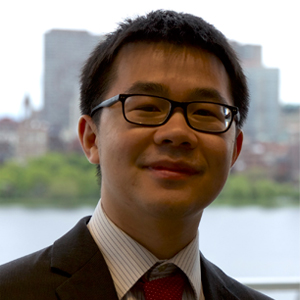Tackling Charles River Restoration
Dan Li's "Urban Climate" class puts arts and sciences into action
Dan Li's "Urban Climate" class puts arts and sciences into action
By Lucy Gilbert (COM`23)
In Professor Dan Li’s “Urban Climate” class (EE 512), students solve real-world problems about climate change — like the relationship between perceived and calculated access to green space in Chelsea and East Boston or the implications, successes, and lessons learned from reusing rainwater in China.
Li’s course is part of the MetroBridge program, which collaborates and sources projects from cities and community organizations. Working with BU faculty and project partners, BU students get to work on real-world projects and have hands-on experiences on topics like racial equity, sustainability, and civic engagement.
This semester, students are tackling a new challenge: protecting, restoring, and enhancing the Charles River.
Li’s class is partnering with the Charles River Watershed Association (CRWA), which is interested in measuring the urban heat island effects of the Charles River Basin, a 20-mile public reservation that stretches along the Charles River. Urban heat islands occur when cities replace the natural land cover with dense concentrations of pavement, buildings, and other surfaces that absorb and retain heat. This effect increases energy costs, air pollution levels, and heat-related illness and mortality.
 “We’re thrilled to be partnering with Professor Li and the Charles River Watershed Association to provide a real-world learning opportunity for students, increasing their career readiness and enhancing their understanding of cities,” said David Gross, the MetroBridge Program Manager. “Professor Li’s partnership with the Charles River Watershed Association is an excellent example of how students and community organizations can both benefit from experiential learning in BU courses.”
“We’re thrilled to be partnering with Professor Li and the Charles River Watershed Association to provide a real-world learning opportunity for students, increasing their career readiness and enhancing their understanding of cities,” said David Gross, the MetroBridge Program Manager. “Professor Li’s partnership with the Charles River Watershed Association is an excellent example of how students and community organizations can both benefit from experiential learning in BU courses.”
In the nineteenth century, a dam was built across the Charles River Basin for industrial, commercial, and residential purposes, including several prisons, coal-burning power plants, and gas works. In addition, two large slaughterhouses dumped waste into the river. As a result, the river became polluted and smelly.

Li’s students are doing an in-depth study to quantify the urban heat island effects over the Charles River Basin. In order to accomplish this, the students will create and tackle a multi-stepped plan. At the end of the semester, the students will report back to CRWA, which will lay the foundation for long-term collaboration, says Li.
“The partnership has been a great first step in what we hope will be a long-lasting relationship that will serve both CRWA and BU students,” said Dira Johanif, who is a Project Partner at the CRWA. “As a non-profit we are limited in our time and resources to dive into the many topics and socio-environmental issues happening in our watershed. This partnership and the work the students are doing has jump-started CRWA’s efforts in looking into the impacts and mitigation strategies for urban heat islands.”
Li believes that it is his job to inspire students to apply the physical concepts so they can therefore understand and analyze the climate that we experience. “On the application side, adapting cities to climate change is a grand challenge facing us in the near future. I hope the students who take this course can contribute to addressing this challenge by coming up with creative ideas,” he said.
Along with addressing the needs and completing research for under-resourced communities, students can also be awarded at the end of the semester for exemplary work. Student nominations come from faculty and are decided by the MetroBridge program each year.

Earth & Environment doctoral student Sean Mueller, who took Urban Climate in the fall of 2021, said the class “didn’t just introduce the problem, but explored various mitigation and adaptation strategies that could help cities combat this climate challenge.”
Mueller’s research uses statistical modeling to predict air pollution concentrations in urban areas. Through the class, he was able to explore a physics-based air pollution trajectory model to calculate which emission sources contribute the most to air pollution in Boston.
“Dr. Li taught us why and how we could use the key parameters governing a city’s propensity to be a heat island to calculate how Boston’s heat island would differ from other cities, such as Phoenix,” Mueller said. He also appreciated the approach that Dr. Li took in teaching this class which included using a variety of teaching methods. “Given that most students weren’t experts in fluid dynamics, myself included, this approach allowed for all students to understand, appreciate, and analyze real data related to complex concepts like global climate change, the atmospheric boundary layer, and urban heat islands.”